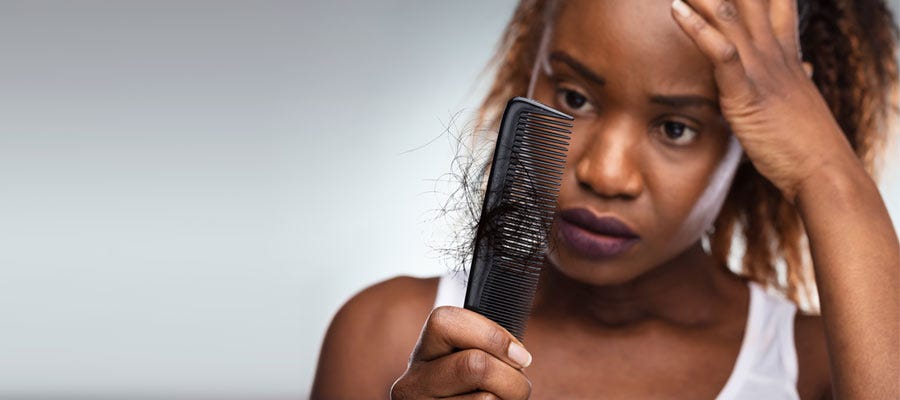Hair loss can occur for a number of reasons, including genetic predisposition, vitamin deficiency, stress, age, underlying health conditions, and more. Diabetes can also contribute to hair loss, though it may not immediately come to mind as a culprit when you think of thinning hair.
We’ve all noticed stray hairs accumulating in a comb, hairbrush, or in the shower drain, but it’s not typically a reason to panic. The American Academy of Dermatology advises that shedding anywhere from 50-100 strands of hair per day is normal.
Though hair loss is a normal part of the natural life cycle of hair growth, sometimes when a hair follicle falls out, a new hair follicle fails to grow in its place. Over time, hair can thin noticeably and patches can appear. This can happen on the scalp as well as other areas of the body.
Causes of Hair Loss in People with Diabetes
Several factors may contribute to a negative impact on the hair growth cycle for people with diabetes, leading to hair thinning and hair loss. We’ve covered some of the most common causes below.
High Blood Sugar Levels
In people with type 1 or type 2 diabetes, excess sugar can build up in the blood stream due to insulin resistance or too little insulin. This can cause a number of issues, especially over time. Chronically elevated blood glucose can cause damage to tissues, organs, and blood vessels. This includes the blood vessels that carry oxygen and nutrients to the hair follicles. This reduced blood flow can affect the hair growth cycle and lead to hair that’s dry and brittle, and eventually hair thinning and slow hair regrowth. It’s important to consult with your healthcare provider if you notice any signs of hair loss on your arms and legs as it could be a sign of damaged blood vessels.
Alopecia Areata
People with type 1 diabetes are more likely to develop a condition called alopecia areata in which the immune system attacks healthy hair follicles. The result is round patches of baldness on the scalp, face, and other parts of the body where hair usually grows. Alopecia Areata can be an unpredictable condition, developing suddenly over just a few days, and sometimes resolving without treatment, especially for those with minimal hair loss.
Thyroid Problems
Thyroid conditions develop when the thyroid gland is either overactive or underactive in its production of certain hormones. This can interrupt the hair growth cycle. When hair falls out naturally, it may not be replaced with new hair growth. In many cases though, hair will begin to grow back after the thyroid condition is treated.
It’s important for people with diabetes to get screened regularly for thyroid disease since people with one autoimmune disease are more likely to develop another. For people that have both diabetes and thyroid problems, poor management of one of these health conditions can negatively affect management of the other. Speak with your healthcare provider if you think you may have a hormonal imbalance.
Iron Deficiency
While this cause is not limited to those with diabetes, it’s still worth mentioning since it’s such a common cause of hair loss for anyone. Iron helps make hemoglobin, which carries oxygen to the cells in your body, including the cells responsible for hair growth. When these cells don’t get enough oxygen, the growth cycle is impacted. Iron deficiency can sometimes be treated with iron supplements, but it’s important to have a healthcare provider check your iron levels first. Taking iron supplements when you don’t have a deficiency can actually cause other health problems.
Medication Side Effects
This is another issue that isn’t specific to diabetics, but since many people who live with diabetes may have co-occurring conditions, it’s important to note. Cancer treatments like radiation and chemotherapy can certainly cause hair loss, as well as medications for high blood pressure and high cholesterol. You can find a comprehensive list of drugs associated with hair loss at the American Hair Loss Association website.
Hair Loss Treatment
Treatment options vary depending on how advanced your hair loss as well as the underlying cause. Here are a few treatments your doctor may suggest:
Biotin
Biotin is a vitamin in the B family of vitamins that is found naturally in foods including eggs, sweet potatoes, avocado, nuts, and others. Most people get enough of this nutrient in their diet, though people with diabetes may have lower levels of biotin. Research has suggested that taking biotin supplements may slow the rate of hair loss in some people. Be sure to ask your doctor if you need a biotin supplement and how much.
Medications
Your dermatologist may suggest minoxidil (Rogaine) to help slow hair loss. Minoxidil is a topical medication that is applied directly to the scalp to stimulate hair growth. It can be used by men or women.
Finasteride (Propecia) is a prescription medication commonly used for hair loss treatment, but is only cleared for use in adult males. Finasteride treats both male pattern baldness (androgenetic alopecia) as well as enlarged prostate.
For people who have been diagnosed with the autoimmune condition alopecia areata, steroids are often recommended. Steroids may be injected or taken orally depending on the severity of the condition.
Lifestyle Changes
Avoid putting your hair in tight braids or hairstyles. You may also want to revisit your hair color or hair relaxing regimen. You can speak with your stylist about the possibility of using products that have gentler ingredients to protect the health of your hair.
Maintaining consistently healthy blood glucose levels can help prevent or stop hair loss due to diabetes, since high blood sugar is what causes damage to the blood vessels. It may take some time to notice a change, however, since the growth cycle of hair is long. There are a few ways you can better control your blood sugar levels over time. Be sure to keep track of your blood sugar levels on a blood sugar log. Your doctor may also prescribe a continuous glucose monitoring device, which can track and report your levels automatically.
Getting exercise helps bring down high blood sugar and gets your blood flowing, which can help deliver nutrients and oxygen to all areas of the body that need it. In addition to these benefits, exercise can help you manage stress and achieve your weight loss goals, which in turn can also help control blood sugar.
Eating a healthy diet full of nutritious foods that will help you feel full without spiking your blood sugar is also an important part of managing diabetes and preventing complications like hair loss.
Experiencing hair thinning or loss can be stressful, especially if it occurs suddenly. But rest assured there are ways to control and sometimes reverse it with the right strategy. Speak to your doctor about the best treatment plan to meet your needs.
References
Drug Induced Hair Loss, American Hair Loss Association
Evidence for Supplemental Treatments in Androgenetic Alopecia, Journal of Drugs in Dermatology, July 2014, Volume 13, Issue 7
Blood Sugar and Exercise, American Diabetes Association
Information provided on the Aeroflow Diabetes blog is not intended as a substitute to medical advice or care. Aeroflow Diabetes recommends consulting a doctor if you are experiencing medical issues or concerns.






